

AP® Psychology
How to answer ap® psychology free response questions.
- The Albert Team
- Last Updated On: March 1, 2022
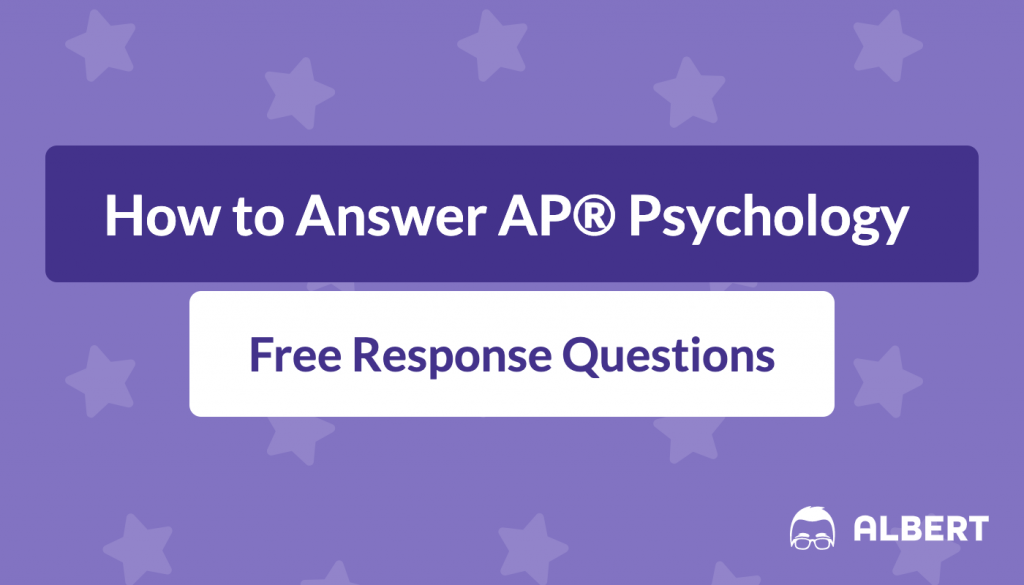
One of the unique characteristics of AP® Psychology is the fact that the FRQ section accounts for just a third of a student’s score. While the free response may not be as greater weighted as the FRQs of other Advanced Placement classes, the two questions posted are still very important to a student’s ability to score a 3, 4, or 5. In this post, we’re going to review the best tips and tricks for answering AP® Psychology free response questions so you can feel confident about your FRQs.
Keep reading to get the scoop on everything you need to make the most of your AP® Psychology exam review.
What We Review
5 Steps on How to Write Effective AP® Psychology Free Responses
There are a few vital steps when it comes to putting your best foot forward in your AP® Psychology free response section.
1. Understand the difference between the concept application question and the research question.
The concept application and the research question are the two types of questions you’ll find on the AP® Psychology free response section.
For the concept application question, you’ll be presented with a scenario in which you will need to apply concepts to the scenario to demonstrate your content mastery. The intent of this question is to assess what the College Board calls Skill Category 1: Concept Understanding.
Concept Understanding is the ability to define, explain, and apply concepts, behavior, theories, and perspectives.
For the research question, you’ll often be given data from some form of research (i.e. experiment, survey, etc) and you’ll be assessed on your mastery of analyzing research studies.
The two skill categories assessed here are Data Analysis and Scientific Investigation.
Data Analysis is as you can imagine, the ability to read and interpret quantitative data.
Scientific Investigation is the ability to analyze psychological research studies.
A few years ago, it wasn’t always guaranteed that students would receive a research question; however, the College Board in recent years has made this more explicit that students should expect one of the two FRQs to be research questions.
Here are two examples of concept application questions from the 2019 and 2018 AP® Psychology exams:
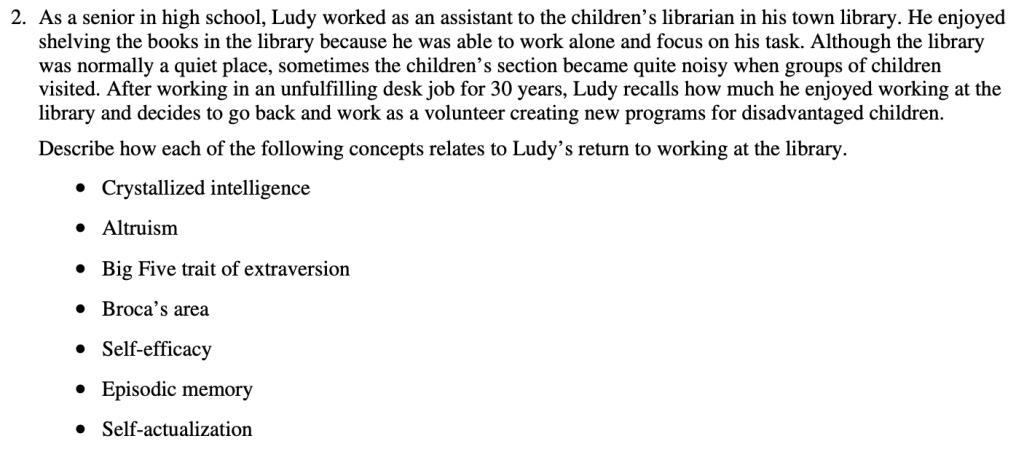
Source: College Board
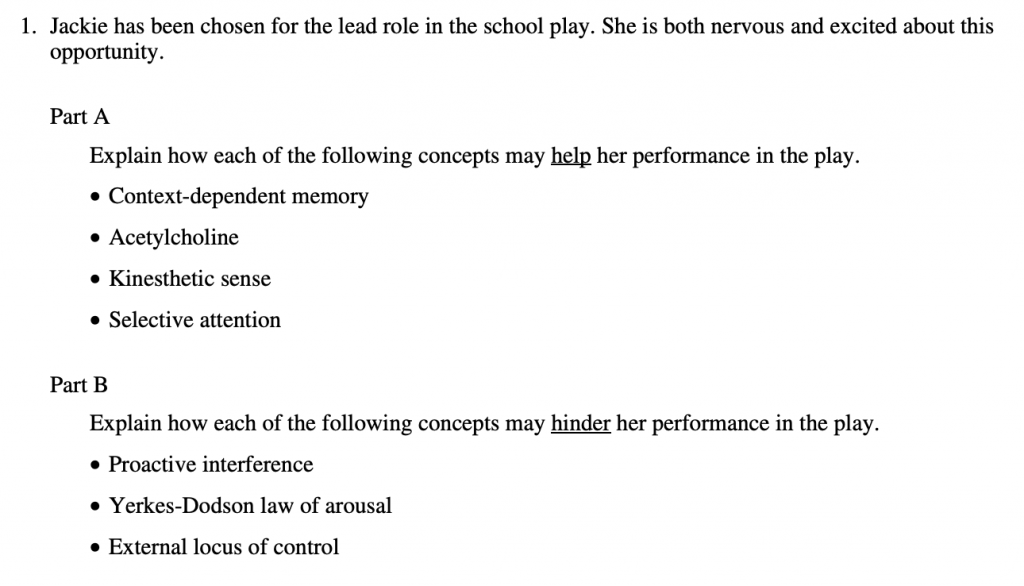
Notice how the key directive for students in these concept application questions is to explain and apply concepts you learned in class.
Here are two examples of research questions from 2019 and 2017:
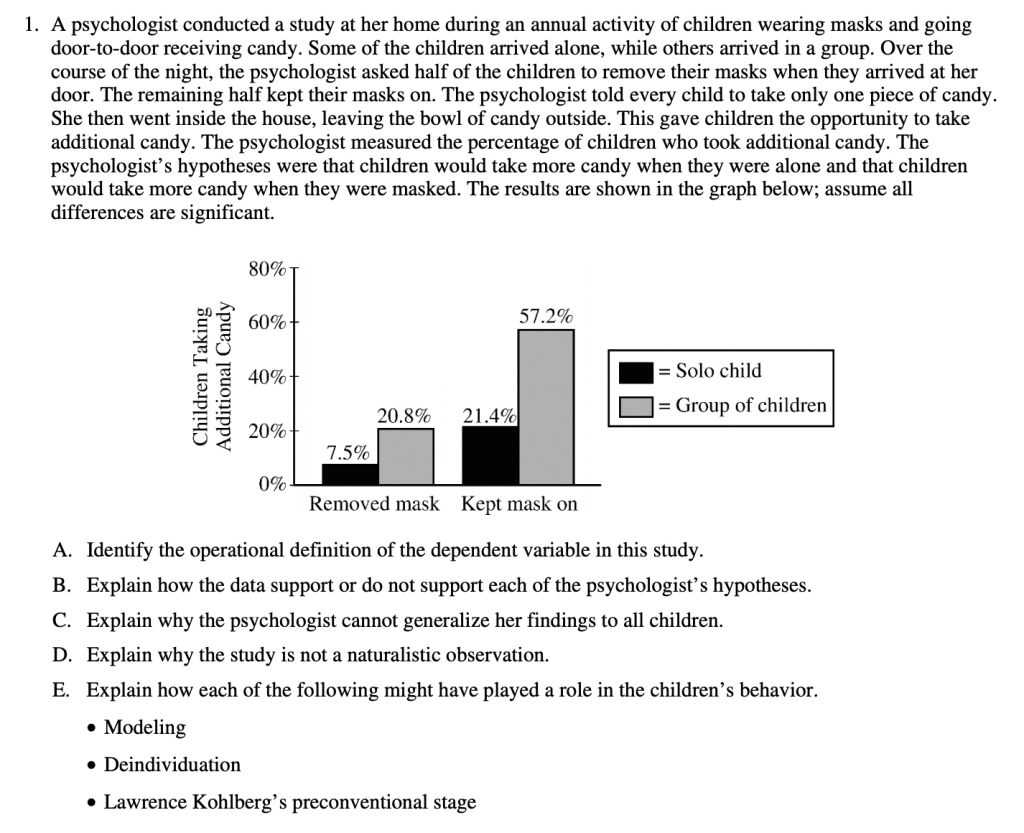
Notice how in these research questions, one part is dedicated to assessing your ability to analyze the set up of the research study, while the other part is more similar to a concept application question and requires explanation of how certain concepts relate to the scenario.
Here is a link for AP® Psychology past released exams
These past exams include scoring guidelines PDFs which outline how points were distributed for each respective question.
2. Learn from the mistakes of students from the past exams.
The nice thing about AP® Psychology is that it hasn’t changed all that much in the last decade. This means referencing past released exams can be a way to gain more insight than you might be able to get from other places.
You can learn a lot from these scoring guidelines. For example, if you read through the 2017-2019 guidelines, you’ll notice the College Board emphasizes a few general rules of thumb regarding the concept application question:
- Answers need to be complete sentences (but spelling or grammatical mistakes are not penalized).
- Just defining concepts or repeating terms given in the prompt is not enough to earn the point.
- You can’t lose points for misinformation unless it directly contradicts correct information that would have scored a point.
When it comes to the research question:
- Answering the wrong question won’t score you points (this shouldn’t be a big surprise).
- Wishy washy answers do not score points. For example, if you’re asked whether or not the data supports the hypothesis, a response that falls into “it depends on how you view it” would not score points.
- Connecting the concept to the behavior addressed in the question was one of the most common student mistakes. Students knew the general idea of a concept but couldn’t apply it.
- Correlation does not equal causation.
- Just knowing methods of research is not enough; you need to be able to compare and contrast related research methods and psychology concepts with each other.
Work your way through the last three year’s worth of scoring guidelines and read about the mistakes of past students. This will help familiarize you understand what to be mindful of when you start answering your own FRQs.
3. Underline or circle what each question part is asking you.
The bulk of the time, you will be asked to identify, describe, or explain.
To properly identify , you must provide 1-2 sentences where you directly answer the question. You will need to name the particular concept and connect it to the question prompt.
To describe , you’ll need to characterize something. This will typically take 2-3 sentences since after you characterize it, you’ll want to apply it back to the prompt. Similar directives more occasionally used could be expressed as show or illustrate .
When asked to explain , these responses often will be three sentences. One sentence to directly respond to the question, followed by 2-3 supporting and specific facts that support your answer. You’ll need to go into depth about how the particular concept or theory connects back to the prompt. Teachers often refer to these questions as ones where you want to “show the why”. Similar directives could be expressed as discuss or relate .
Aside from the directives, build the habit of also marking key vocabulary words or influential people brought up.
4. Plan out your response BEFORE you start writing.
Taking just a couple minutes to think about your response to each part of the AP® Psychology free response questions can make a huge difference in the thoroughness of your answers.
Consider what studies from your class you can bring in; citing past studies you’ve been exposed to is a stronger response than giving a personal life example when responding to an FRQ. Think about how clear it is as to why you’re bringing up an example or study.
Finally, consider what your topic sentence will be in each explanation of yours. Writing one can help bring clarity to your thoughts as you mold your response to the question.
Remember, the College Board uses the free response of the AP® Psychology exam to assess your ability to apply concepts, read and interpret data, and analyze psychological research studies.
This means this section just recalling definitions is not enough to earn you points. You must be able to apply what you know to the situations described to you.
5. Practice, practice, and then practice some more.
There is no better way to build your AP® Psychology free response test-taking confidence than through practicing.
You need to practice in order to gain exposure to enough past AP® Psych FRQs to better understand what sorts of questions will be asked of you.
For example, when it comes to the research question, you’ll be tested to demonstrate you know what is a hypothesis, independent variable, dependent variable, random sample, potential biases, and more.
The College Board provides a plethora of past released exams to help you navigate the preparation process, so use them!
We recommend teaming up with a friend or two to work on the same year together. Then, use the scoring guidelines to review the sample responses, and then to grade each other’s work. This will help you understand how a peer may have responded to the same question you answered, as well as what would and would not score you points.
20 AP® Psychology FRQ Tips to Scoring a 4 or 5
Now that we’ve gone over five steps to writing effective AP® Psychology free response questions, we can dig into test taking tips and strategies to help with approaching the concept application and research question.
We recommend you read through a few of these every time you start and end your AP® Psychology FRQ practice. Then, in the days leading up to your exam, read the entire list so they stay fresh in your mind.
7 AP® Psychology Concept Application Question Tips and Test Taking Strategies
- Be mindful of your time spent for the concept application question. The research question typically takes more time so you need to allocate time accordingly.
- Always define your term before you provide an example that relates back to the prompt. This helps serve as backup and demonstrates what you know.
- Remember to apply the term. Defining the term alone is not enough.
- Some teachers have told their students to underline the term in their responses; this is up to you, but could be a nice way to cue your reader in when they’re looking for whether or not you understand the definition of the term.
- One way to remember the last time is UDA: underline the term or concept being tested, define the term without using the term itself in the definition, and apply the term to an example.
- Use synonyms when elaborating on your definition of a term. Don’t use the term itself with its definition.
- Leave a line break or space after each part of your response. This makes it easier for your reader to follow along vs. a long block of text.
3 AP® Psychology Research Question Tips and Test Taking Strategies
- Review your definitions every day in the two weeks leading up to the exam. Make sure you’re confident in identifying the operational definition of different variables, what is a hypothesis, independent variable vs. dependent variable, etc. Here is a link to a series of operational definition flashcards.
- Include topic sentences when you’re explaining. They help give your responses direction as you translate the question for yourself.
- When providing supporting examples or studies, clearly state the purpose of you doing so. Avoid abstract references.
10 General AP® Psychology Free Response Tips and Test Taking Strategies
- Write in complete sentences. You should not outline or bullet your AP® Psychology free response answers.
- Outline your responses before you begin writing by using your question sheet.
- Be concise and direct. Don’t skirt around in your responses.
- This is not an AP® History class. There is no need for an introduction or conclusion paragraph.
- Don’t make diagrams or lists; you only get points for responses that use sentences.
- Use the appropriate psychological terms when responding to the FRQs. Same goes for the proper names of theories and theorists.
- Remember you can’t lose points for incorrect answers unless they contradict part of a correct response.
- Answer what you know first. Leave space for the things you don’t know or need more time to think about to go back to that part later.
- If you’re low on time and need to squeeze out a response, feel free to scratch out what you don’t want your reader to read. An erasable pen can also be helpful.
- Watch YouTube videos to refresh your memory on key concepts and theories. Crash Course has a great playlist that is a little dated but still helpful here .
Wrapping Things Up: How to Write AP® Psychology FRQs
We’ve gone over a lot in this AP® Psychology study guide. At this point, you should have everything you need to begin practicing writing your concept application and research question responses.
As we wrap things up, here are a few takeaways to remember:
- It’s important to always define the term, and then apply the term to an example. One cannot happen without the other.
- Create a system for yourself on how you’ll respond to each part of both questions. Consider using the UDA method for term-based questions. This is where you’ll underline the term, define the term, and then apply it.
- Plan your responses before you start writing by using your question sheet. Make sure your response is concise and direct, and structured in a way that is easy to grade.
- Master all your key psychological terms. Go through at least three years of past exams to familiarize yourself with the sorts of questions asked on the research question.
- Budget your time accordingly. Make sure you do not spend too much time on one question that you’re left with insufficient time to fully address the other question.
We hope you’ve taken away a lot from this AP® Psychology review guide.
If you’re looking for more free response questions or multiple choice questions, check out our website! Albert has tons of original standards-aligned practice questions for you with detailed explanations to help you learn by doing and score that 4 or 5.
If you found this post helpful, you may also like our AP® Psychology tips here or our AP® Psychology score calculator here .
We also have an AP® Psychology review guide here .
Interested in a school license?
Popular posts.

AP® Score Calculators
Simulate how different MCQ and FRQ scores translate into AP® scores

AP® Review Guides
The ultimate review guides for AP® subjects to help you plan and structure your prep.

Core Subject Review Guides
Review the most important topics in Physics and Algebra 1 .

SAT® Score Calculator
See how scores on each section impacts your overall SAT® score

ACT® Score Calculator
See how scores on each section impacts your overall ACT® score

Grammar Review Hub
Comprehensive review of grammar skills

AP® Posters
Download updated posters summarizing the main topics and structure for each AP® exam.
Interested in a school license?

Bring Albert to your school and empower all teachers with the world's best question bank for: ➜ SAT® & ACT® ➜ AP® ➜ ELA, Math, Science, & Social Studies aligned to state standards ➜ State assessments Options for teachers, schools, and districts.
AP Psychology Practice Tests
The AP Psychology Exam is divided into two sections with the following time allotments:
AP Psychology Glossary
All About AP Psychology Exam
If you are a mobile user, click here: Do AP Psychology Practice Questions .
AP Psychology Multiple-Choice Practice Tests
- AP Psychology Practice Test 62: Foundations (History)
- AP Psychology Practice Test 63: Foundations (Methods and Approaches)
- AP Psychology Practice Test 64: Biological Bases (The Brain and Nervous System)
- AP Psychology Practice Test 65: Biological Bases (Consciousness)
- AP Psychology Practice Test 66: Sensation and Perception
- AP Psychology Practice Test 67: Learning
- AP Psychology Practice Test 68: Cognitive Psychology (Memory, Language, and Problem-Solving)
- AP Psychology Practice Test 69: Cognitive Psychology (Intelligence and Testing)
- AP Psychology Practice Test 70: Developmental Psychology
- AP Psychology Practice Test 71: Motivation and Emotion
- AP Psychology Practice Test 72: Personality
- AP Psychology Practice Test 73: Clinical Psychology (Disorders)
- AP Psychology Practice Test 74: Clinical Psychology (Treatment)
- AP Psychology Practice Test 75: Social Psychology
- AP Psychology Practice Test 1
- AP Psychology Practice Test 2
- AP Psychology Practice Test 3
- AP Psychology Practice Test 4
- AP Psychology Practice Test 5
- AP Psychology Practice Test 6
- AP Psychology Practice Test 7
- AP Psychology Practice Test 8
- AP Psychology Practice Test 9
- AP Psychology Practice Test 10
- AP Psychology Practice Test 11
- AP Psychology Practice Test 12
- AP Psychology Practice Test 13
- AP Psychology Practice Test 14
- AP Psychology Practice Test 15
- AP Psychology Practice Test 16
- AP Psychology Practice Test 17
- AP Psychology Practice Test 18
- AP Psychology Practice Test 19
- AP Psychology Practice Test 20
- AP Psychology Practice Test 21
- AP Psychology Practice Test 22
- AP Psychology Practice Test 23
- AP Psychology Practice Test 24
- AP Psychology Practice Test 25
- AP Psychology Practice Test 26
- AP Psychology Practice Test 27
- AP Psychology Practice Test 28
- AP Psychology Practice Test 29
- AP Psychology Practice Test 30
- AP Psychology Practice Test 31
- AP Psychology Practice Test 32
- AP Psychology Practice Test 33
- AP Psychology Practice Test 34
- AP Psychology Practice Test 35
- AP Psychology Practice Test 36
- AP Psychology Practice Test 37
- AP Psychology Practice Test 38
- AP Psychology Practice Test 39
- AP Psychology Practice Test 40
- AP Psychology Practice Test 41
- AP Psychology Practice Test 42
- AP Psychology Practice Test 43
- AP Psychology Practice Test 44
- AP Psychology Practice Test 45
- AP Psychology Practice Test 46
- AP Psychology Practice Test 47
- AP Psychology Practice Test 48
- AP Psychology Practice Test 49
- AP Psychology Practice Test 50
- AP Psychology Multiple-Choice Practice Test 51
- AP Psychology Multiple-Choice Practice Test 52
- AP Psychology Multiple-Choice Practice Test 53
- AP Psychology Multiple-Choice Practice Test 54
- AP Psychology Multiple-Choice Practice Test 55
- AP Psychology Multiple-Choice Practice Test 56
- AP Psychology Multiple-Choice Practice Test 57
- AP Psychology Multiple-Choice Practice Test 58
- AP Psychology Multiple-Choice Practice Test 59
- AP Psychology Multiple-Choice Practice Test 60
- AP Psychology Multiple-Choice Practice Test 61
AP Psychology Free-Responsive Practice Tests
- AP Psychology Free-Responsive Practice Test 1
- AP Psychology Free-Responsive Practice Test 2
- AP Psychology Free-Responsive Practice Test 3
- AP Psychology Free-Responsive Practice Test 4
- AP Psychology Free-Responsive Practice Test 5
- AP Psychology Free-Responsive Practice Test 6
- AP Psychology Free-Responsive Practice Test 7
- AP Psychology Free-Responsive Practice Test 8
AP Psychology Downloads
- AP Psychology Practice Test: History, Approaches, & Research Methods pdf download
- AP Psychology Practice Test: Biological Bases of Behavior pdf download
- AP Psychology Practice Test: Sensation & Perception pdf download
- AP Psychology Practice Test: States of Consciousness pdf download
- AP Psychology Practice Test: Learning pdf download
- AP Psychology Practice Test: Memory pdf download
- AP Psychology Practice Test: Language & Cognition pdf download
- AP Psychology Practice Test: Motivation & Emotion pdf download
- AP Psychology Practice Test: Developmental Psychology pdf download
- AP Psychology Practice Test: Personality pdf download
- AP Psychology Practice Test: Testing & Individual Differences pdf download
- AP Psychology Practice Test: Abnormal Behavior pdf download
- AP Psychology Practice Test: Treatment of Abnormal Behavior pdf download
- AP Psychology Practice Test: Social Psychology pdf download
- AP Psychology Free-Response Practice Test 1
- AP Psychology Free-Response Practice Test 2
- AP Psychology Free-Response Practice Test 3
- AP Psychology: History and Approaches Practice Test
- AP Psychology: Research Methods Practice Test
- AP Psychology: Biological Bases of Behavior Practice Test
- AP Psychology: Sensation and Perception Practice Test
- AP Psychology: States of Consciousness Practice Test
- AP Psychology: Learning Practice Test
- AP Psychology: Cognition Practice Test
- AP Psychology: Motivation and Emotion Practice Test
- AP Psychology: Developmental Psychology Practice Test
- AP Psychology: Personality Practice Test
- AP Psychology: Testing and Individual Differences Practice Test
- AP Psychology: Abnormal Behavior Practice Test
- AP Psychology: Treatment of Abnormal Behavior Practice Test
- AP Psychology: Social Psychology Practice Test
- More AP Psychology Downloads
More AP Psychology Practice Tests
- AP Psychology Practice Test 1: Scientific Foundations (History and Approaches)
- AP Psychology Practice Test 2: Scientific Foundations (History and Approaches)
- AP Psychology Practice Test 3: Scientific Foundations (Methods)
- AP Psychology Practice Test 4: Scientific Foundations (Methods)
- AP Psychology Practice Test 5: Scientific Foundations (Methods)
- AP Psychology Practice Test 6: Scientific Foundations (Methods)
- AP Psychology Practice Test 7: Biological Bases of Behavior
- AP Psychology Practice Test 8: Biological Bases of Behavior
- AP Psychology Practice Test 9: Biological Bases of Behavior
- AP Psychology Practice Test 10: Biological Bases of Behavior
- AP Psychology Practice Test 11: Biological Bases of Behavior
- AP Psychology Practice Test 12: States of Consciousness
- AP Psychology Practice Test 13: States of Consciousness
- AP Psychology Practice Test 14: Sensation and Perception
- AP Psychology Practice Test 15: Sensation and Perception
- AP Psychology Practice Test 16: Sensation and Perception
- AP Psychology Practice Test 17: Sensation and Perception
- AP Psychology Practice Test 18: Learning
- AP Psychology Practice Test 19: Learning
- AP Psychology Practice Test 20: Learning
- AP Psychology Practice Test 21: Learning
- AP Psychology Practice Test 22: Cognition
- AP Psychology Practice Test 23: Cognition
- AP Psychology Practice Test 24: Cognition
- AP Psychology Practice Test 25: Cognition
- AP Psychology Practice Test 26: Cognition
- AP Psychology Practice Test 27: Testing and Individual Differences
- AP Psychology Practice Test 28: Testing and Individual Differences
- AP Psychology Practice Test 29: Testing and Individual Differences
- AP Psychology Practice Test 30: Developmental
- AP Psychology Practice Test 31: Developmental
- AP Psychology Practice Test 32: Developmental
- AP Psychology Practice Test 33: Developmental
- AP Psychology Practice Test 34: Motivation and Emotion
- AP Psychology Practice Test 35: Motivation and Emotion
- AP Psychology Practice Test 36: Motivation and Emotion
- AP Psychology Practice Test 37: Motivation and Emotion
- AP Psychology Practice Test 38: Personality
- AP Psychology Practice Test 39: Personality
- AP Psychology Practice Test 40: Personality
- AP Psychology Practice Test 41: Personality
- AP Psychology Practice Test 42: Clinical Psychology (Psychological Disorders)
- AP Psychology Practice Test 43: Clinical Psychology (Psychological Disorders)
- AP Psychology Practice Test 44: Clinical Psychology (Psychological Disorders)
- AP Psychology Practice Test 45: Clinical Psychology (Treatment of Psychological Disorders)
- AP Psychology Practice Test 46: Clinical Psychology (Treatment of Psychological Disorders)
- AP Psychology Practice Test 47: Clinical Psychology (Treatment of Psychological Disorders)
- AP Psychology Practice Test 48: Clinical Psychology (Treatment of Psychological Disorders)
- AP Psychology Practice Test 49: Social Psychology
- AP Psychology Practice Test 50: Social Psychology
- AP Psychology Practice Test 51: Social Psychology
- AP Psychology Practice Test 52: Social Psychology
- AP Psychology Practice Test 53: Social Psychology


Choose Your Test
Sat / act prep online guides and tips, the expert's guide to the ap psychology exam.
Advanced Placement (AP)

Taking AP Exams can be stressful, but if you know what to expect on test day, you can eliminate a lot of that anxiety. The AP Psychology exam is one of the more popular AP tests, and it has a pretty straightforward format and scoring system. In this article, I'll tell you what's on the AP Psychology test, how it's graded, and which prep methods you should use to get a great score.
How Is the AP Psychology Exam Structured?
The AP Psych test consists of two sections : a multiple-choice section and a free-response section.
Overall, AP Psychology is one of the shorter AP exams, clocking in at just two hours in total . The exam will take place on Tuesday, May 3, 2023, at noon .
Before we get into the details of each section, here's an overview of what AP Psych looks like:
Section 1: Multiple Choice
Here is a quick rundown of the multiple-choice section format:
- Number of Questions: 100
- Time: 70 minutes
- Scoring: Worth 2/3 of your final AP Psych score
All multiple-choice questions come with five possible answer choices (labeled A-E). These questions will typically ask you to do the following, per the College Board :
- Define and explain content from a range of course topics
- Apply skills of concept application, data analysis, and scientific investigation
Section 2: Free Response
Here is an overview of the free-response section on the AP Psychology test:
- Number of Questions: 2
- Time: 50 minutes
- Scoring: Worth 1/3 of your final AP Psych score
The first free-response question is a Concept Application question, while the second question is a Research Design question.
Both questions will ask you to do the following, per the College Board :
- Explain behavior and apply theories using concepts from different theoretical frameworks or subdomains in the field
- Analyze psychological research studies, including analyzing and interpreting quantitative data

Ah, May. The flowers are blooming, the birds are chirping—and the rustle of freshly opened AP test booklets fills the air.
How Is the AP Psychology Exam Scored?
Now that you understand the structure of the AP Psychology exam, it's time to learn how your final AP score is calculated . As mentioned, the multiple-choice section is worth 67% of your final Psych score, while the free-response section is worth 33% of your score.
For multiple choice, scoring is relatively simple: you earn a point for every question you answer correctly . No points are deducted for incorrect answers or questions left blank; therefore, you can earn a maximum of 100 points on the multiple-choice section.
Free-response questions are reviewed by AP graders. You'll get a score out of 7 for each of the two questions. Each of these scores is then multiplied by 3.57 so that, together, they make up 1/3 of your total raw AP Psychology score.
Your raw score is then compared with the curve calculated by the College Board to see what score you'll get on the final 1-5 AP scale.
The following table offers estimated raw-to-AP-score conversions for the AP Psychology test. Keep in mind that each year the curve is slightly different, so this will give you a rough estimate of your score and not an exact prediction .
Source: The College Board
For example, let's say you got 55 questions right on the multiple-choice section and scored a 4 on one free-response question and a 5 on the other. This would add up to a raw score of around 87 because 55 + (4 * 3.57) + (5 * 3.57) = 87.13. Based on the chart above, this score would translate to 3 for your final AP score .
Topics and Example Questions on the AP Psychology Test
In this section, I'll give you some real-life examples of test questions so you can get a better idea of what the AP Psychology test is actually like.
As a preface to the questions, here are the nine overarching topics you'll see on AP Psych . You should consult this list to make sure that you've fully reviewed the content for the test and are not missing anything important (especially in the most common topic areas).
Source: AP Psychology Course and Exam Description, 2019-2020
Multiple-Choice Question Example
Here is a sample question from the 2020 AP Psychology Course and Exam Description :
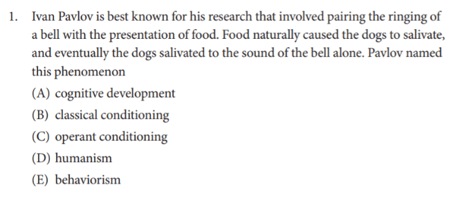
You should be able to tell right away that this behavior has been conditioned in the dogs , so the answer will be either B or C. In psych, "conditioning" refers to a kind of behavioral process in which a particular response becomes more frequent and/or predictable. So already you've eliminated the other three possible answer choices.
Now, to select the correct answer, you need to know the difference between classical conditioning and operant conditioning. Classical conditioning refers to involuntary responses that occur due to past experiences, while operant conditioning refers to voluntary responses that occur as a result of past experiences.
Because the dogs are salivating without consciously meaning to—in other words, it's a completely involuntary bodily response— the correct answer must be B (classical conditioning) .

Free-Response Question Example
The following free-response question also comes from the 2020 AP Psych Exam Description :
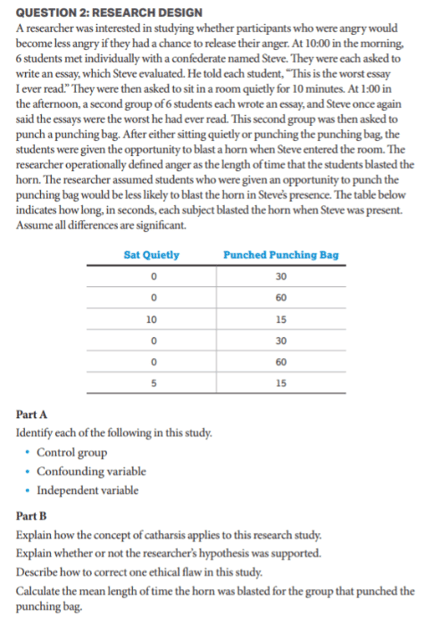
Here are the answers for each part as described in the official scoring guidelines .
Part A—3 Points
- Control Group: One point for a response that identifies the control group as the group that sat quietly
- Confounding Variable: One point for a response that identifies the confounding variable as the time of day
- Independent Variable: One point for a response that identifies the independent variable as whether the students punched the punching bag

Part B—4 Points
- Catharsis: One point for a response that explains that students were supposed to experience the release of strong negative feelings by punching the punching bag
- Hypothesis: One point for a response that explains that the researcher's hypothesis was not supported, as those students who punched the bag actually ended up honking the horn at Steve for longer periods of time
- Ethical Flaws: One point for a response that describes the need for debriefing the students, because the researcher used deception
- Mean: One point for calculating the mean to be 35

"Does free will exist, or am I just a made-up person who exists solely to provide context for a question on an exam taken by beings in an alternate universe?" Oh, Annabelle, save it for college.
How to Prep for the AP Psychology Exam: 6 Critical Tips
If you're aware of the AP Psych exam's structure and content, you can use specific prep methods to help you succeed on the test. Here are six tips guaranteed to give you a higher chance of earning a great AP Psych score.
#1: Take Practice Tests
The best way to prepare for standardized tests like AP Psychology is to take practice tests so that you have a good idea of where your weaknesses lie . Practice tests will also help you get used to the format of the test and the types of questions it asks.
The College Board offers practice free-response questions from previous years (up to 2021). You can also access three full-length official AP Psychology practice tests as free PDFs:
- 2012 AP Psychology Exam
- 1999 AP Psychology Exam
- 1994 AP Psychology Exam
To simulate the real testing experience, I recommend printing out the test and writing/bubbling in your answers to the questions rather than doing them on the computer. You should also time yourself accurately so you can be sure you don't run out of time on the actual exam.
After you take a practice test or two, review your answers to see which content areas gave you the most trouble. Focus on going over the topics for which you had the highest concentration of incorrect answers.
#2: Make Use of AP Classroom
In 2019, the College Board released an online portal called AP Classroom , which connects students with their AP teachers. You can turn in homework on the portal, get feedback on your assignments, and receive access to official AP Psych study materials, including a question bank with real test questions. Your teacher will run the AP Classroom course page.
#3: Use the Topic Breakdown Information
For AP Psychology, we know exactly which topics will be covered and how frequently we can expect to see them on the test. This is valuable information you can use to your advantage when studying.
Specifically, spend more time reviewing unfamiliar topics that are especially common on the exam . It's better to know the ins and outs of a high-frequency topic super well than to have only a rudimentary knowledge of two low-frequency topics. Prioritize wisely!

#4: Learn to Budget Your Time Appropriately
This is something you can do in conjunction with taking practice tests. On the AP Psychology test, you only have about 40 seconds for each multiple-choice question. This means you have to be smart about skipping questions that are taking up too much of your time (and either going back to them later or picking a random letter—remember that there's no penalty for incorrect answers, so you should definitely fill in every single one!).
If you take a practice test and find that you're often running out of time, you might need to push yourself to work faster or move on from difficult questions more quickly.
You'll also have just 25 minutes for each free-response question on the test. The good news is that free-response questions on AP Psychology are scored based on the information you provide and not on your mastery of the essay format. Basically, y ou don't have to write an introduction and a conclusion , which will save you a lot of time.
#5: Go Over Important Terms
On the AP Psych exam, it's crucial for you to know the meanings of key terms related to the course. Questions often ask you to explain how a scenario relates to a certain psychological concept. But i f you don't remember what the concept means, you won't be able to answer the question.
There are lots of confusing terms in AP Psychology, which is why it's so important that you take the time to compile them and go through them methodically when you study. This is especially true of terms you learned at the beginning of the school year , as they'll be less fresh in your mind when the time comes to take the test.
#6: Avoid Cramming
There's a lot to remember for AP Psychology, and you aren't going to be able to stuff it all in your brain in one night!
For courses like this that are memorization-heavy, it's best to get in the habit of studying as you go along and taking the time to review old material periodically . If you can gradually build up your knowledge throughout the school year and avoid completely forgetting what you learned at the beginning of class, the exam will feel much less stressful for you.
Every one or two months, do a comprehensive review of everything you've learned so far to refresh your memory. You might be surprised by how little you have to study for the AP Psych test at the end of the school year when everyone else is freaking out!

And remember, ladies, you're never too busy to throw on a little eye glitter between study sessions.
Recap: What to Know About the AP Psychology Test
The AP Psychology exam is a relatively short AP test. However, because it encompasses a variety of content areas, it's important to know all the key terms and psychological theories that are covered in the course.
In order to succeed on this test, you must be able to connect specific psychological terminology to a wide range of different scenarios .
Overall, AP Psychology is probably one of the easier AP exams, but that doesn't mean you should skip studying. Make sure you take official practice tests and are fully aware of the exam's format and content so you won't be caught off guard on test day!
What's Next?
Still not sure if AP Psychology is the right choice for you? Learn more about AP classes and tests to see whether it's worth it to take them . You can also dip your toe in the AP Psych pool with this article about Stockholm Syndrome (something you'll likely learn about in AP Psych).
What do AP scores mean for your future? Find out more about how AP credit works at colleges .
Trying to plan out your schedule? Read this article to get a better idea of how many AP classes you should take based on your college goals.

Samantha is a blog content writer for PrepScholar. Her goal is to help students adopt a less stressful view of standardized testing and other academic challenges through her articles. Samantha is also passionate about art and graduated with honors from Dartmouth College as a Studio Art major in 2014. In high school, she earned a 2400 on the SAT, 5's on all seven of her AP tests, and was named a National Merit Scholar.
Student and Parent Forum
Our new student and parent forum, at ExpertHub.PrepScholar.com , allow you to interact with your peers and the PrepScholar staff. See how other students and parents are navigating high school, college, and the college admissions process. Ask questions; get answers.

Ask a Question Below
Have any questions about this article or other topics? Ask below and we'll reply!
Improve With Our Famous Guides
- For All Students
The 5 Strategies You Must Be Using to Improve 160+ SAT Points
How to Get a Perfect 1600, by a Perfect Scorer
Series: How to Get 800 on Each SAT Section:
Score 800 on SAT Math
Score 800 on SAT Reading
Score 800 on SAT Writing
Series: How to Get to 600 on Each SAT Section:
Score 600 on SAT Math
Score 600 on SAT Reading
Score 600 on SAT Writing
Free Complete Official SAT Practice Tests
What SAT Target Score Should You Be Aiming For?
15 Strategies to Improve Your SAT Essay
The 5 Strategies You Must Be Using to Improve 4+ ACT Points
How to Get a Perfect 36 ACT, by a Perfect Scorer
Series: How to Get 36 on Each ACT Section:
36 on ACT English
36 on ACT Math
36 on ACT Reading
36 on ACT Science
Series: How to Get to 24 on Each ACT Section:
24 on ACT English
24 on ACT Math
24 on ACT Reading
24 on ACT Science
What ACT target score should you be aiming for?
ACT Vocabulary You Must Know
ACT Writing: 15 Tips to Raise Your Essay Score
How to Get Into Harvard and the Ivy League
How to Get a Perfect 4.0 GPA
How to Write an Amazing College Essay
What Exactly Are Colleges Looking For?
Is the ACT easier than the SAT? A Comprehensive Guide
Should you retake your SAT or ACT?
When should you take the SAT or ACT?
Stay Informed
Get the latest articles and test prep tips!
Looking for Graduate School Test Prep?
Check out our top-rated graduate blogs here:
GRE Online Prep Blog
GMAT Online Prep Blog
TOEFL Online Prep Blog
Holly R. "I am absolutely overjoyed and cannot thank you enough for helping me!”

IMAGES
VIDEO
COMMENTS
Download free-response questions from past exams along with scoring guidelines, sample responses from exam takers, and scoring distributions. If you are using assistive technology and need help accessing these PDFs in another format, contact Services for Students with Disabilities at 212-713-8333 or by email at [email protected]. The ...
Each free-response question is worth 7 points. When you take the AP exam, your scores will be multiplied by 3.57 so that, in total, the free-response section makes up ⅓ of your total raw AP Psychology exam score. (Your raw score is then compared with the curve calculated by the College Board to see what score you'll get on the final 1-5 AP ...
The response earned point 6 because the response indicates that the students are thinking about their own thinking processes. The response earned point 7 because the response indicates that Group 1 is engaging in deep processing and doing so improves their understanding of the material. Sample: 2B Score: 5.
Original free-response prompts for AP® Psychology that mimic the questions found on the real exam. Our expert authors also provide an exemplary response for each AP free response question so students can better understand what AP graders look for.
Use your time wisely. You will have 50 minutes to complete the FRQ portion of the AP Psychology exam. You can answer the two questions in any order. The most efficient use of your time will be to start by answering the parts of the questions in which you feel most confident, earning you the most points in the shortest time.
There are four official AP Psych practice tests you can download for free as PDFs: 2016 AP Psychology Exam. 2012 AP Psychology Exam. 1999 AP Psychology Exam. 1994 AP Psychology Exam. If you're looking for more free-response practice specifically, you can try working on official free-response questions in isolation.
What We Review. 5 Steps on How to Write Effective AP® Psychology Free Responses. 1. Understand the difference between the concept application question and the research question. 2. Learn from the mistakes of students from the past exams. 3. Underline or circle what each question part is asking you. 4.
20 free AP psychology practice tests. Over 200 AP psychology practice questions to help you with your AP psychology exam prep. Toggle navigation Toggle navigation. ... 100 questions: 70 minutes: II: Free-Response: 2 essay questions: 50 minutes: If you are a mobile user, click here: Do AP Psychology Practice Questions.
6 min read • november 17, 2021. John Mohl. John Mohl. AP Psych Free Response Question for Problems in Research. These questions are modeled after Free Response Questions (FRQs) of the AP Psychology Exam. Below would most likely represent one of two questions that could appear on the FRQ.
AP Psychology Exam Overview The Exam . The AP Psychology Exam 📓 consists of. 100 multiple-choice questions. 70 minutes. 66.7% of the score. 2 free-response questions. 50 minutes. 33.3% of the final score. AP Skills . Skill 1: Concept Understanding - Requires you to identify and explain various concepts and theories from the course. You must ...
Section 2: Free Response. Here is an overview of the free-response section on the AP Psychology test: Number of Questions: 2. Time: 50 minutes. Scoring: Worth 1/3 of your final AP Psych score. The first free-response question is a Concept Application question, while the second question is a Research Design question.
To get all the points possible for a free-response question on the AP Psychology exam, you must complete all the specified tasks and subtasks. Often questions supply a single task (or set of two tasks) that you'll need to complete for each of the listed bullet points. Sometimes, however, questions will contain a few distinct tasks, each ...
Study guides & practice questions for 6 key topics in AP Psych Unit 1 ... AP Psychology Free Response Questions. ... 7 min read. 🌶 FRQ Practice (2018-19) - Slides. slides by Megan Revello. AP Cram Sessions 2021. 🌶️ AP Psych Cram Review: Unit 1: Scientific Foundations of Psychology. streamed by John Mohl.